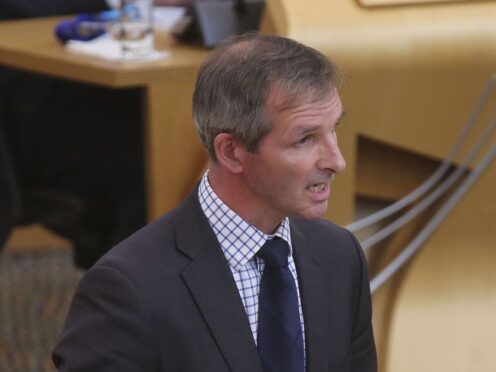
A Bill to make assisted dying legal in Scotland could be introduced at Holyrood in the “coming weeks”, the MSP behind the legislation has said.
Liam McArthur is the third MSP to try to pass such controversial legislation through the Scottish Parliament.
But he has already said he hopes his member’s Bill could have enough support to pass its its crucial first vote – something the two previous attempts at legislation failed to achieve.
He has now confirmed to MSPs that he would “hope to be in a position to formally introduce my Assisted Dying For Terminally Ill Adults (Scotland) Bill in the coming weeks”.

In his consultation for the Bill, the Liberal Democrat MSP set out how two doctors would be required to certify that a person is terminally ill, and also that they have the mental capacity to request an assisted death and are making an “informed decision” on this “without pressure or coercion”.
A “reflection period” would then take place before a doctor would prescribe the necessary medication, which the person would have to be able to take themselves.
Mr McArthur said he had already discussed his proposed legislation with “many” other MSPs at Holyrood, but said he would be “happy” to talk to others about his Bill.
“Please do not hesitate to get in touch, or ‘collar’ me in passing,” he told MSPs in an update about the proposals.
We have published our report on Assisted dying/Assisted suicide.
Thank you to all who contributed to our inquiry by sharing their views and experiences.
You can read the full report here: https://t.co/cluNOwhF7u
A message from our Chair, Steve Brine MP:
— Health and Social Care Committee (@CommonsHealth) February 29, 2024
Last month a report from the House of Common’s Health and Social Care Committee warned that the Government at Westminster must consider what to do if the law on assisted dying is changed in part of the UK, the Isle of Man or Jersey.
The Committee said legalisation in at least one jurisdiction was looking “increasingly likely”, with the issue currently being considered in Jersey and the Isle of Man – both of which are British Crown Dependencies. These are not part of the UK, but are “self-governing possessions of the British Crown”.
The Committee report said: “Ministers should be actively involved in discussions on how to approach the divergence in legislation.”
Mr McArthur meanwhile highlighted that the Committee had said it “did not see any indications of palliative and end-of-life care deteriorating in quality or provision” following the introduction of assisted dying in other countries – with the report adding that such legislation has in some places “been linked with an improvement in palliative care”.
But Miro Griffiths, a spokesman for the Better Way campaign group, which is opposed to the legislation, said: “We will be standing with many others in Scotland again Mr McArthur’s assisted dying Bill.
“This proposal threatens the most vulnerable and marginalised in society, and no amount of legal drafting, or politicians’ promises, can make it safe.”
He said Better Way was “deeply worried” about the impact the legislation could have on “patient safety, disability equality, suicide prevention and other areas”.
He added: “Marginalised people facing severe forms of inequality would be subjected to overt and covert pressure to end their lives. This is why assisted dying has been rejected time and again in the UK.”

Enjoy the convenience of having The Sunday Post delivered as a digital ePaper straight to your smartphone, tablet or computer.
Subscribe for only £5.49 a month and enjoy all the benefits of the printed paper as a digital replica.
Subscribe